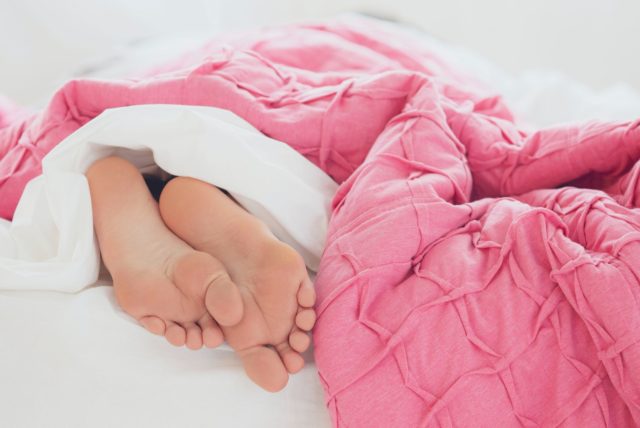Tips for a Good Night’s Sleep
By: Kristen Lipari, Ph.D. | April 28, 2023

Sleep is essential to every process in the body. Sleep affects our physical, mental, and emotional functioning, immunity, and metabolism. Lack of sleep, or poor quality of sleep can leave us vulnerable to increased anxiety and mood symptoms. When we don’t sleep well, we feel fatigued the next day, which makes it difficult to attend to our basic needs. For example, we make unhealthy food choices, are less patient with others, and have a harder time retaining information.
If you have trouble falling asleep, staying asleep, or if you wake up too early, you experience poor quality of sleep. It is common for sleep habits to fall off track for a multitude of reasons at different points in life, such as the perinatal period.
When sleep practices are tailored to suit your needs, you are more likely to sleep well throughout the night and feel well rested throughout the day.
Practicing good sleep hygiene gets us back on track with healthy sleep patterns, even when we’re coming off a few days (or weeks!) of restless nights. You can maintain good sleep hygiene when you commit to sleep promoting habits and create an environment that promotes consistent, uninterrupted sleep.
Use the sleep hygiene tips below, adopted from The Sleep Foundation, to help you get your zzz’s.
Authors Note: When you start out making healthy changes in your life, start small and with the most accessible changes first. This helps build on your successes for sustainable change.
Sleep Hygiene Tips
1. Establish a Sleep Schedule
-
- Wake up at the same time every day and try to go to sleep at the same time every night. When you keep a consistent sleep routine your body has a chance to calibrate a healthy sleep-wake cycle so you can benefit from a good rhythm of consistent sleep.
- Try your best to resist late night temptations like watching your favorite show, scrolling on Instagram, or staying out late with friends. Remember the reasons why you choose to prioritize sleep, like to feel more energized the next day.
- Make small, gradual adjustments to your sleep schedule so you can be consistent in your efforts. For example, if you go to bed at midnight and you know that’s far too late to get your ideal 8 hours of sleep per night, then scale back your bedtime by 15 minutes each day until you are closer to your ideal bedtime.
- Reduce and eventually eliminate naps to promote healthy sleep. If you must nap, do not nap for more than 20-30 minutes, and make sure your naps fall before 1-2 PM. Anything later can make falling asleep much more difficult.
2. Create a Wind Down Routine
-
- Follow the same routine each night to give your body cues that sleep is ahead. For example, change into your pajamas, wash your face, brush your teeth, do some light stretching, diaphragmatic breathing and other relaxation exercises to help your body slow down.
- Dim your lights before bed; doing so cues melatonin production in your body, a hormone that helps you fall asleep.
- Avoid electronics or screens 30-60 minutes before bed. When we’re on our phones or watch TV before bed, we signal our mind to be alert, which is not conducive to sleep.
- If you can’t fall asleep, try not to be hard on yourself. Use this time to rest, practice deep breaths and comfort yourself. The more critical we are of ourselves, the more difficult it is to fall asleep.
3. Practice Daily Sleep Promoting Habits and Create a Peaceful Sleep Environment
-
- Get plenty of natural sunlight during the day to drive your circadian rhythm which regulates the sleep-wake cycle and makes you feel sleepy at night. An adequate dose of daily Vitamin D derived from sunlight has many health benefits.
- Invite healthy movement throughout the day and stay away from nicotine, caffeine, and alcohol – substances that make it infinity more difficult to fall sleep.
- Use your bed for sleep only. You can’t expect to fall asleep if you also study, watch TV or chat with friends from bed. When you use your bed for sleep only, your body learns to associate your bed with sleep, and you will fall asleep more easily.
- Ensure that your environment is sleep-friendly, with a comfortable bed and bedding that is well suited to the temperature in your room at night.
- Keep your room dark, quiet, and on the cool side to facilitate a good night’s rest. Consider using a white noise machine to drown out sounds that could wake you up and communicate with people you live with to minimize sleep disturbance. If you’re in a time zone where the sun rises well before you need to be awake, use blackout curtains to filter the light.
Still Have Trouble Sleeping?
If you’ve “tried it all” and still struggle to have good quality sleep, you may benefit from an insomnia evaluation from a sleep specialist who is trained in Cognitive Behavioral Therapy for Insomnia (CBT-I), which is based on principles of Cognitive Behavioral Therapy (CBT). CBT-I is the gold standard treatment for insomnia that includes a thorough sleep assessment, stimulus control and sleep restriction therapy, cognitive restructuring, and relaxation. Research shows that CBT-I is more effective than medication in the long-term treatment of insomnia.
While many clinicians are experienced with sleep hygiene or some of the components of CBT-I, few use the comprehensive approach of assessment, intervention, and outcome measures to treat insomnia. Many individuals see improvement in their sleep in the first 3 weeks of treatment with CBT-I.
If you are interested in developing strategies to improve your sleep with CBT-I, contact a San Diego psychologist at Therapy Changes. A member of our team who specializes in sleep related concerns will help you identify and address specific sleep issues. You don’t have to suffer another sleepless night, and you don’t have to do this alone. Contact us today to schedule an appointment.
Photo by Tracey Hocking on Unsplash



